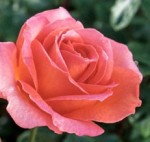 Most of us select our roses on the basis of color, form, size, number of petals, and disease resistance, rarely on fragrance. Yet most gardeners enjoy the scent of their roses and can’t resist bending down to give a sniff as they pass by an attractive bloom. Many factors enter in to the enjoyment of a rose’s fragrance; some of them you can manipulate, others you can’t.
Most of us select our roses on the basis of color, form, size, number of petals, and disease resistance, rarely on fragrance. Yet most gardeners enjoy the scent of their roses and can’t resist bending down to give a sniff as they pass by an attractive bloom. Many factors enter in to the enjoyment of a rose’s fragrance; some of them you can manipulate, others you can’t.
The fragrance of a rose is released by tiny glands on the underside of the petals. Some varieties have many glands others don’t. A complex set of chemical reactions is necessary for the fragrance to be produced and sun and warm facilitate the reactions. The nature of the fragrance (spicy, fruity, musky etc.) depends on the presence of specific chemicals that the rose inherited from its parents. The most important of these in regard to fragrance are traditionally called “essential oils” and include Rhodinol (old rose scent), Geraniol (geranium leaf), Nerol (magnolias), Eugenol (spicy). Experts on rose fragrance have identified up to 24 different scents reflecting the complexity of the chemical nature of fragrance.
With this background on the chemical nature of fragrance, here are some points to consider when working to maximize the fragrance of your roses.
Rose Choice
Some varieties are more fragrant than other so pick ones that are fragrant. Here are some general considerations.
 Darker roses are more fragrant than lighter ones.
Darker roses are more fragrant than lighter ones.
 The more petals, the more fragrance.
The more petals, the more fragrance.
 Petals that are thick and velvety produce more fragrance than thin ones.
Petals that are thick and velvety produce more fragrance than thin ones.
 Some rose petals keep their fragrance when dry (and so are good for potpourri); most don’t.
Some rose petals keep their fragrance when dry (and so are good for potpourri); most don’t.
 Red and pink roses tend to have the traditional classic rose scent
Red and pink roses tend to have the traditional classic rose scent
 Yellow and white roses have scents that are compared to orrisroot, nasturtiums, or lemon.
Yellow and white roses have scents that are compared to orrisroot, nasturtiums, or lemon.
 Orange roses tend to have scents of fruit, orris, nasturtium, violet, or clover.
Orange roses tend to have scents of fruit, orris, nasturtium, violet, or clover.
Weather
 Warm sunny days bring out the best fragrance.
Warm sunny days bring out the best fragrance.
 Moist soil promotes fragrance (apply water judiciously especially in times of drought)
Moist soil promotes fragrance (apply water judiciously especially in times of drought)
Time of Day
 Roses tend to have more fragrance later in the day than in the morning but this is variable and the fragrance of a rose growing in a warm sunny morning could decline by afternoon.
Roses tend to have more fragrance later in the day than in the morning but this is variable and the fragrance of a rose growing in a warm sunny morning could decline by afternoon.
Health
 Mildew causes a loss of scent
Mildew causes a loss of scent
Good cultural practices will cut down on mildew and increase soil moisture but will also improve flowering and scent production. You don’t have control of the weather but you certainly can make sure that the roses are growing so that they can meet their full potential. Pick roses that are known to have the fragrances you like, grow them well, and you will maximized your olfactory experience.
